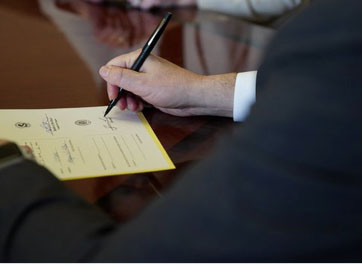Gov. Spencer Cox signs a bill during the signing ceremony held today in the Gold Room of the Capital.
SALT LAKE CITY – Gov. Spencer Cox held a ceremonial signing of the remaining law enforcement and mental health bills passed by the Legislature.
“Today we held a signing ceremony for a set of bills that significantly increases access to mental health services that will improve our children’s lives,” Cox said. “We’re grateful to the bill sponsors who worked tirelessly on these important issues.”
In the Gold Room on the 2nd Floor of the State Capitol, Cox put pen to paper on 12 bills, signaling what he called his commitment to implement fair laws and to provide mental health resources for Utahns as outlined in the One Utah Roadmap.
Signed into law were Senate Bills 126 (Officer Intervention and Reporting Amendments), 171 (Behavioral Health Curriculum Program) and 179 (Criminal Justice Amendments).
Also signed into law were House Bills 13 (Special License Plate Designation), 23 (First Responder Mental Health Services), 117 (Victim Address Confidentially Program), 138 (Juvenile Justice Modifications), 153 (Child Welfare Interview Requirement), 226 (Higher Education and Corrections Council), 289 (Insurance Coverage for Emergency Medical Service Personnel), 295 (Physician Workforce Amendments) and 403 (Justice Reinvestment Initiative Modifications).
“The Legislature has prioritized connecting youth to crisis intervention services,” said state Sen. Chris Wilson (R-Dist.25). “S.B. 171 … creates a youth behavioral health curriculum that will be available at no cost to students.
“It also provides one-time funding for the Huntsman Mental Health and the State Office of Education to develop, update and publish the curriculum to individuals and organizations throughout the state.”
In 2015, the Legislature passed the Justice Reinvestment Initiative and prosecutors have been complaining ever since.
“S.B. 179 follows the reform’s original intent,” according to Wilson, “by focusing prison beds on violent offenders and provides treatment for the addicted and mentally ill.
“But the data collection requirement is stricter and stops Commission on Criminal and Juvenile Justice funding for organizations that do not comply.”
The people tasked with protecting the safety of our communities quite often take the stresses of to their jobs home with them, the senator explains. H.B. 23 requires all first responder agencies to provide mental health resource for employees, spouses, their children and retirees.
Additionally, it’s difficult to recruit first responders with no pay. H. B. 289 creates the Volunteer Emergency Medical Service Personnel Health Insurance Program to promote recruitment and retention of these volunteers by providing insurance.
“For children who participate in a Division of Child and Family Services (DCFS) child welfare interview, it can be a traumatic experience,” Wilson explains. “H.B. 153, with the support of DCFS, established procedural changes that will help the child being interviewed feel supported and comfortable.”
Invited to the ceremonial signing were Senators Luz Escamilla, Daniel Thatcher, Derrin Owens, Todd Weiler, Jani Iwamoto, Kirk Cullimore, Brad Wilson, Evan Vickers and Don Ipson.
Also invited to the signing ceremony were Representatives Melissa Ballard, Steve Eliason, Lowry Snow, Dan Johnson, Matthew Gwynn, Marsha Judkins, Stephanie Pitcher, Ryan Wilcox, Calvin Musselman and Cory Maloy.
Representing the state were Commissioner Jess Anderson, Utah Department of Public Safety; Tracy Gruber, Utah Departments of Human Services; Brian Nielson, Utah Department of Corrections; Andrea Parrish, Utah Department of Corrections; Nubia Pena, senior state equity advisor; and Brittney Cummins, senior state education advisor.

